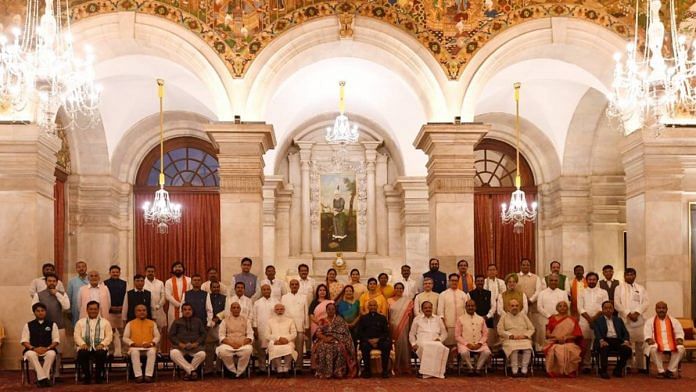New Delhi: The thrust of Prime Minister Narendra Modi’s first cabinet overhaul, since his 2019 mandate, has been on caste arithmetic in view of the seven assembly elections due next year and the 2024 Lok Sabha polls.
Following the induction of 36 fresh faces, the Council of Ministers now has 27 OBC ministers, 12 Scheduled Caste ministers and eight from the Scheduled Tribes. The remaining 30 belong to the so-called upper caste category.
This is unprecedented as the first Modi government in 2014 had 13 OBC ministers, three Dalits, six tribals and 20 upper castes. In 2019, there were 13 OBCs, six Dalits, three tribals and 32 upper castes.
Following Wednesday’s overhaul, five of the OBC ministers, two of the Dalits and three tribals have Cabinet berths.
While OBCs have been rewarded for their association with the BJP, the overhaul also appears to underline how crucial they are to the party’s prospects in the upcoming assembly elections.
Also read: Caste equations take centre stage as 7 from UP make it to Team Modi ahead of assembly polls
OBC importance, Dalit appeasement & assembly elections
Among those rewarded with a seat in the Council of Ministers is Kaushal Kishore, the Dalit MP from Mohanlalganj seat in Lucknow district who was among the first BJP leaders to raise the issue of lack of beds and oxygen during the second Covid wave in Uttar Pradesh. He had lost his brother to Covid and had slammed Chief Minister Yogi Adityanath over Covid “mismanagement” in the state.
Sources said the reason behind his induction into the Council of Ministers was to create goodwill among Dalits in Uttar Pradesh following the Covid fiasco in the state.
UP is set for assembly elections next year. That would also explain the induction of Jalaun MP Bhanu Pratap Verma and Agra MP S.P. Singh Baghel, both Dalits. Baghel began his career as a security officer of Samajwadi Party supremo Mulayam Singh Yadav.
The OBC faces from Uttar Pradesh include Apna Dal MP Anupriya Patel, who had served as MoS, Health and Family Welfare, between 2016 and 2019, besides Maharajganj MP Pankaj Chaudhary and 59-year-old Rajya Sabha MP B.L. Verma.
From Gujarat, where elections are due at the end of 2022, OBC leader Darshana Vikram Jardosh and Munjapara Mahendrabhai, a member of the Dalit Koli community, are now part of Team Modi.
“The prime minister has given the highest representation to Gujarat in recent times,” a BJP leader from the state told ThePrint. “In Congress rule, only two ministers were from Gujarat. Now six ministers are from the state, representing every caste including two ministers from the dominant Patel community.”
Also read: PM Modi’s new team is a governance reboot tempered with politics
2024 Lok Sabha polls play their part
From West Bengal, the induction of Santanu Thakur, who belongs to the Matua community, and Nisith Pramanik, a member of the Rajbanshi community, appears to have been done keeping in mind the 2024 Lok Sabha polls. The Modi government has also inducted tribal leader John Barla from the state.
It is a similar story for Maharashtra, where the party has reached out to the adivasi and OBC communities. The new Union ministers from the state include the BJP’s OBC face and Bhiwandi MP Kapil Moreshwar Patil, and Rajya Sabha MP Dr Bhagwat Kishanrao Karad, also an OBC. Another new minister from the state is Dindori MP Bharati Pravin Pawar, who is a tribal.
The new ministers from Karnataka, where elections are due in 2023, include Shobha Karandlaje, a Vokkaliga; Bhagwanth Khuba, a Lingayat; A. Narayanaswamy, a Dalit; and Rajeev Chandrasekhar, a Nair.
In the cabinet from Madhya Pradesh, apart from Jyotiraditya Scindia, who is now the civil aviation minister, is Virendra Kumar, a seven-term MP from the Scheduled Caste community. He has been handed the Ministry of Social Justice and Empowerment.
“Giving such large representation to all communities was necessary due to the upcoming assembly elections and keeping in mind the 2024 polls,” a senior BJP leader said. “BJP has expanded vertically and horizontally and so from Manipur, Tripura to Odisha, we have kept in mind social engineering and regional aspirations to choose ministers.”
He added: “Many of them are not caste leaders of their own community but a narrative matters in politics. Otherwise, why would Virendra Kumar, who was a minister in the first term and was dropped, be re-inducted again? It shows our commitment to correcting any representational mistakes we made.”
(Edited by Arun Prashanth)
Also read: 4 new Bengal faces in Team Modi reveal BJP’s state strategy for 2024 polls



